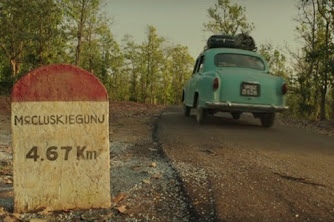FILM REVIEW: A Death in the Gunj
FILM REVIEW: A DEATH IN THE GUNJ
Film: A Death
in the Gunj
Director: Konkona
Sen Sharma
Writers: Konkona
Sen Sharma
Starring: Vikrant
Massey, Kalki Koechlin, Tillotama Shome, Ranvir Shorey, Jim Sarbh
Genre: Drama,
Thriller
"A Death in the Gunj" is a powerful and thought-provoking drama film directed by Konkona Sen Sharma. Set in the late 1970s, the film follows the story of Shutu, a shy and introverted young man, who joins his family on a holiday in the small town of McCluskiegunj. As Shutu struggles to fit in with the group, which includes his boisterous cousin, Vikram, and a group of his friends, he finds himself caught between trying to conform to societal expectations and staying true to himself.
Analysis:
The film is a slow-burning character study that effectively captures the complexities of human relationships, particularly the unspoken tensions and resentments that simmer beneath the surface. The ensemble cast, which includes Vikrant Massey, Kalki Koechlin, and Ranvir Shorey, delivers strong performances that bring the characters to life.
The film is a masterful character study that effectively captures the complexities of human relationships, particularly the unspoken tensions and resentments that simmer beneath the surface. The ensemble cast, which includes Vikrant Massey, Kalki Koechlin, and Ranvir Shorey, delivers strong performances that bring the characters to life. The film is predominantly set on a house and the audience can feel the sense of isolation, confinement and suffocation that Shutu feels.
The setting of the film in the late 1970s adds an interesting layer to the story, as it serves as a backdrop for the social and political changes that were taking place in India at the time. The film also explores themes of masculinity, identity, and the pressure to conform to societal norms, which are particularly relevant to the main character, Shutu. The audience can observe a contrast between the liberal and free-thinking Shutu and his aggressive and patriarchal cousin, Vikram and how the society shapes and moulds them.
The film's cinematography, by Sirsha Ray, is another standout aspect of the film. The movie captures the beauty of the town and its surroundings with a perfect blend of natural colors and tones, but also effectively conveys the sense of isolation and confinement that Shutu feels. The film's score, composed by Indian Ocean, adds to the mood of the film, with its haunting melodies and subtle use of traditional instruments, It's hard to ignore the melancholic feeling which is portrayed through the music.
The film's climax
is one of the most powerful and profound scenes in the film. The audience can
feel a sense of despair and hopelessness with the characters. The ending of the
movie might not seem to have a proper closure, but it is a fitting end to the
story. It's ambiguous, but it doesn't leave the audience feeling unsatisfied.
Conclusion:
In conclusion, "A Death in the Gunj" is a well-crafted and thought-provoking film that effectively captures the complexities of human relationships and the struggles of growing up. The movie is a poignant and powerful drama that explores the universal themes of identity and the pressure to conform to societal norms with subtlety and nuance. The film received a positive response from the critics and audience alike, and it is a must-watch for anyone interested in powerful storytelling and thoughtful filmmaking.
Rating: 5/5




Comments
Post a Comment